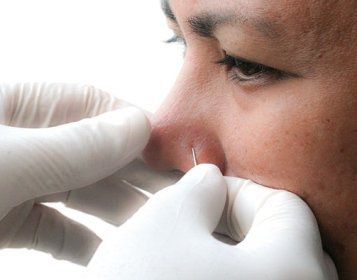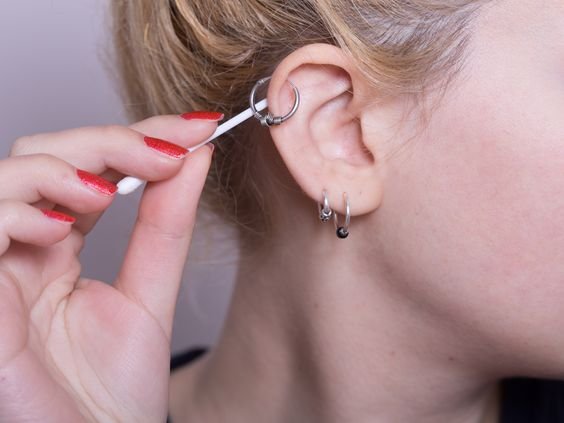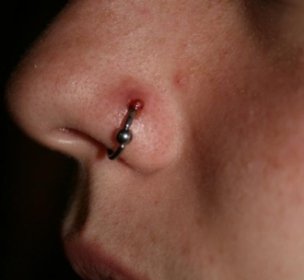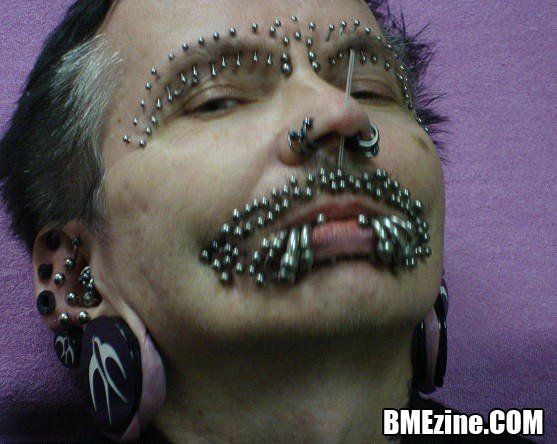Piercing Aftercare 101 - Caring For Your Body Piercings

Caring For Your Piercings
If you're here, it's probably because you've either just gotten a piercing or are planning to get one in the future. If so, you've come to the right place to have all your piercing aftercare questions and concerns resolved! As you're probably well aware of by now, with each piercing comes the small added responsibility of learning how to care for the piercing as well as the fun and excitement of having a new piercing. Let's get those questions and concerns out of the way so you can get on with the enjoying the piercing itself!
General Aftercare Tips for Piercings:
Sea Salt Soaks:
Sea salt soaks and sprays are some of the best things you can use to care for your new piercing and ensure that it heals properly as they help to accelerate healing as well as decreasing pain or dicomfort. These solutions don't have to be costly or time consuming though. Believe it or not, you actually have several options when it comes to applying sea salt-based solutions! If you're a busy person, you may prefer a store bought solution such as Natures Pure Defense of H2Ocean piercing aftercare spray. With this option, you'll typically want to apply the spray to your piercing 3 to 6 times daily as it heals. If you have the time for it, you can (and may quite likely benefit from) making and applying at least 2 homemade sea salt solution soaks (what a tongue twister!) per day. You can do this by boiling a cup of water for at least five minutes (or simply using distilled water), stirring in a pinch (maybe 1/4 teaspoon) of SEA SALT (not table salt!), letting the mixture cool down, and either submerging the pierced area in the solution or applying the mixture to both sides (when applicable) of your piercing with clean cotton balls. You'll want to apply the solution to the pierced area for several minutes (up to 10 if your piercing is particularly irritated) a couple of times per day if possible. You can also do a combination of store bought and homemade solutions and sprays! It's really up to you, your budget, and the needs of your body. (As for me, I typically go with the H2Ocean for on-the-go application so I can apply and get on with my busy day!)

Cleaning Instructions for Your New Piercing:
Most new piercings should be cleaned at least a few times daily until they heal. Piercing aftercare sprays and sometimes certain soaps can be an ideal way to keep the area clean and debris-free. The sprays will not only sooth the irritated area but will help hydrate the skin and wash debris from the hole of the piercing. Sometimes, due to your piercer's recommendation or if you have a saline allergy, it may be preferable for you to use soap instead of or in addition to a saline-based piercing aftercare spray. In this case, be sure to choose a antimicrobial, frangrance-free soap and rinse well with water after you've finished washing. Whenever washing your piercing or showering, try to remember to pat the pierced area dry with a paper towel or other disposable paper product, as opposed to a towel or rag which can harbor bacteria.
If you have the time to do it and have the mixture of sea salt to water balances, you can apply your sea salt solution as often as you'd like without any issues. With soap, however, it can be easy to overdo it. When using soap, you usually won't need to use it more than a couple of times per day anyway but the optimal frequency of use depends a bit on several factors such as your environment, the sensitivity of your skin, and your lifestyle in general (ie: exercise or working construction may cause the piercing site to collect and harbor debris or bacteria that you'll want to wash out as soon as possible). In this case, listen to your body and, when that feels, contact your piercer (or us!) with any questions or concerns you may have regarding caring for your piercing.

A few things to keep in mind while healing:
-Never touch your new piercing with dirty hands.
-Don't pick at your piercing! If necessary, you can try to gentle rub crusty areas away with a cotton ball after soaking them in sea salt solution. Try not to remove scabs, however, as this can lead to scarring and can delay the healing process.
-Keep up with your piercing aftercare and feel free to return to it even after the piercing has healed if it becomes irritated in the future.
-If the piercing site becomes infected, particularly if it's having trouble healing or doesn't appear to be healing properly, consult your piercer and/or doctor immediately.
-DO NOT use alcohol or hydrogen peroxide to clean your piercing. These will actually dry out the piercing site which will delay the healing process.
-You may shower or bathe as usual but be sure to fully rinse off any soap products you may get on your piercing and dry with disposable paper products, rather than a regular bath towel.
-The healthier you are, the easier it will be for your piercing to heal so be sure to get sleep, eat well, observe good hygiene practices, avoid stress, limit or eliminate alcohol and drug consumptions, and consider taking vitamins (particularly vitamin c and zinc) to help expedite your body's ability to heal itself.
-Have patience with your piercing. Healing times vary from person to person. Be sure to follow your piercing aftercare procedure through until you're fully healed and don't try to switch your jewelry out until then. If you must switch your jewelry, I recommend that you visit your piercer to have it switched professionally and avoid any added risks of infection or inflammation. Trust me; I know from experience and learning the hard way that it's worth the wait!
What to expect while your piercing is healing:
Don't be alarmed if you see some bleeding, clear fluid (lymph), bruising, swelling, tenderness, mild discomfort, itchiness, or discoloration around your piercing site. These are all common in flesh wounds including new piercings! There are steps you can take to minimize these reactions, however. Try taking ibuprofen instead of asprin or lessen your alcohol and caffeine intake if possible/applicable. Keep in mind that if you start to see pus or severe redness around your piercing or the pierced area burns when lightly touched, you may be in need of antibiotics. If the reactions or pain get too intense you may want to consult a doctor just to assure you don't have a serious infection, allergy, etc. Once you've started on antibiotics and confirmed that you don't have any additional complications, sticking to a strict piercing aftercare regime should keep you from having to remove the piercing completely.

Specific Piercing Area Aftercare Instructions:
While most piercings can be cared for in generally the same way, there are a few key things that make each piercing unique and may slightly affect the way you care for yours. There are also specific tips and tricks that can be used when caring for a particular type of piercing. Here, I'll share what I've learned and go into detail about each of the major piercing types as well as a few of the more specific types as well so read on and see if I can answer any questions you may have!:
Ear Piercings:
After getting your brand new ear piercing, you'll want to do your best to keep it clean. Since it's so near your face and hair, this can be a bit more of a challenge than with piercings in lower areas of your body. For starters, be sure to keep makeup, lotion, hair products, etc off of the piercing area. If you DO get any of these substances on your ear piercing, follow your regular piercing aftercare guidelines to clean it off as soon as possible. Be sure to keep your pillow cases and bedding clean, particularly if you have pets, and try sleeping on the side of your head without the new piercing when applicable. If that's not possible, try sleeping on your back or avoid putting excessive pressure on the piercing as much as possible.
Nose Piercings:
Use the sea salt solution mentioned above to clean the outside of your nostril and saline spray to clean the inside. Avoid washing the pierced area with stronger facial cleansers and be sure to rinse such cleansers off as soon as possible if they do come in contact with the pierced area.
Septum Piercings:
It is important to follow aftercare procedures for a septum piercing very carefully as it can be dangerous if bacteria is allowed to grow around the piercing. Keeping this area clean is vital to proper healing. Try not to touch the piercing excessively and be careful that it does not get caught on clothing, hair, body srubbers (in the shower), etc. During the healing process, septum piercings tend to stay more clean and free from blood or puss than many other piercings but extra care should be taken if you get a cold or if your nostrils are exposed to anything that could irritate the area while your septum is still healing. Refrain from swimming, submerging your septum piercing in water, excessive exposure to dust, or changing the jewelery as these actions can introduce harmful bacteria into the piercing and add to the risk of infection. If you need to hide your septum piercing while it's healing, you may want to get pierced with a titanium septum keeper. This will allow you to hide the piercing without changing your jewelery.
Cheek & Lip Piercings:
Use caution when opening your mouth. Opening too wide, especially while eating, can cause the jewelry to catch on your teeth. The main difference between a mouth-area piercing is that the outside and inside of your mouth have to be cared for differently. Use your sea salt solution as a rinse for the inside of your mouth (normal tooth brushing times, after meals, etc) and spray aftercare spray on the outside 3-6 times daily. You may also use sea salt solution soaked cotton balls on the outside piercing area a couple of times per day as well. Avoid oral sex, tongue kissing, and contact with anyone else's bodily fluids. Avoid the use of alcohol (including mouthwashes that contain alcohol), any kind of tobacco, and gum and try not to play with the jewelry (whether with your hands, tongue, teeth, etc) as this can not only increase healing time and risk of irritation for your piercing but can also damage your teeth and gums.
Labret Piercings:
For the most part, lip piercings all require the same basic aftercare however certain factors may cause the required steps, precautions, amounts of effort, and particular actions to vary from person to person and piercing to piercing. One such example of this is common with labret piercings: scratching against the gums or teeth. If the jewelry scratches or rubs your gums or teeth, you will likely need to change jewelry and will need to keep an eye on the piercing, give extra care to keeping the area clean (ie: more frequent brushing and mouth washing), and make a conscious effort not to move the jewelry around or play with it so that it doesn't excessively scratch at areas inside the mouth. The main concern is for the well-being of the gums and teeth as damage to these areas tends to be permanent. Keep an eye on your piercing. In extreme cases, you may even have to forfeit the piercing to preserve the health and longevity of your tooth enamel and gums (which may begin to recede with excessive wear or rubbing) but don't worry! Most labret piercings heal smoothly without any serious complications and if yours isn't one of them you'll still look beautiful and may even find that you're more suited for a piercing elsewhere!
Monroe Piercings:
A labret stud (post jewel that screws into a flat disc-shaped base) is the typical jewelry for this type of piercing. As mentioned in the paragraph above, if the piercing is allowed to rub against the teeth or gums, it can cause serious irreversible damage. If you notice any signs of enamel erosion or gum recession, you'll want to remove the piercing before it's too late! The most common problem with disc-back jewelry such as the labret stud, however, is skin attempting to grow around and enclose the base of the disc. You'll want to assure this does not happen to your piercing because if it does the only way you'll be able to remove it will be to cut it out of your skin. It can also trap bacteria inside it as it grows over and that can lead to infection. Fortunately, proper care will significantly decrease the chances of this happening to your piercing! For starters, make sure your jewelry is the proper size and that you're not irritating it with unnecessary movement or friction. A change of jewelry size of material may be the next course of action if the sea salt soaks aren't effective. I recommend having a professional change the jewelry for you, particularly if the piercing site is irritated, inflamed, or infected, as changing the jewelry out improperly can lead to more damage.
Tongue Piercings:
With a tongue piercing, be sure to rinse your mouth with saline solution a few times per day, namely morning, night, and after eating. You can also alternate the saline solution rinses with warm water rinses just to clear any food and debris that may be lingering in your mouth. Be sure to keep your mouth debris free. If possible, buy a new toothbrush (preferably soft-bristled) to start using after getting your new tongue piercing. This prevents bacteria that may have been on your old toothbrush from getting into your fresh piercing. Tongue piercings are expected to swell (hence the additional length of the starter barbell as opposed to the permanent jewelry). Accordingly, you may experience difficulty eating anything other than soft foods at first and you'll want to avoid tougher foods too so that you don't risk injury to your swollen tongue when trying to chew. As your piercer will typically tell you at the time of piercing, you can think about switching your piercing jewelry to a shorter barbell after about 4 to 6 weeks, depending on how fast you heal. The shorter barbell will be less likely to catch on your teeth, food, etc. While healing, avoid oral sex, tongue kisses, playing with your jewelry, consumption of alcohol or tobacco, and excessive caffeine. Don't worry if you notice a bit of white discharge. It's a natural part of your body's efforts to heal itself. If your tongue starts to swell or bleed excessively, however, you'll want to contact your piercer or doctor right away.
As for tips from my personal tongue piercing experiences: Drink cooler drinks - even frozen beverages - to help reduce your tongue's swelling. If possible, carry spare balls with you in case you lose or break one. Try and keep the balls on the end of your piercing tight (use clean hands to check!) so that you won't swallow them but be prepared with spares just in case! Sometimes, you may feel some pain from the piercing. You can take ibuprofen to help with this as well as to reduce the swelling. Sleeping with your head elevated for the first few days after getting your piercing will also help to minimize overnight swelling.
Nipple Piercings:
I won't lie, out of the many piercings I've had done, these were the most painful piercings I've experienced. They were, however, COMPLETELY worth it and stopped hurting once the jewelry was in! If you choose to take a leap and get yours pierced, here are a few things to try and keep in mind to minimize your post-piercing pain: Nipple piercings take longer than many other piercings to completely heal (sometimes 9 months to 1 year) and can even begin to close up relatively quickly after the healing period, depending on your body, if the jewelry is removed for periods of time as short as a few hours. For women, nipples may swell during the menstrual cycle, which may cause some discomfort to healing piercings. This is normal. If it becomes unbearable, which is fairly rare, you can use ibuprofen for the pain. You may choose to sleep in a cotton shirt or other clothing which you change daily/often for awhile after getting your piercing for comfort as well as to protect the nipples from bacteria and contaminants that could cause infection or irritation.
Belly Button Piercings:
Avoid clothing and belts that rest tightly on, add pressure to, or cause friction to this piercing. Breathable bandages under the clothing can help to minimize rubbing of clothing against the piercing in order to prevent unnecessary irritation.
Genital Piercings:
One key difference to keep in mind with this type of piercing is that you should NOT use soap as an aftercare product for it as even the most mild of soaps can irritate the area, especially when pierced. Stick to the sea salt solutions and aftercare sprays. This type of piercing is notoriously quick to heal, especially in females. Intercourse and other sexual activities can usually be resumed within a month or so. Of course, with all piercings and bodies, each is different so pay attention to what yours is telling you! Also remember to stay clean and take care of yourself because a clean, healthy body and lifestyle means a healthy, happy piercing. If possible, avoid sharing bodily fluids whenever possible and DEFINITELY during the healing period.
Surface Piercings:
Most surface piercings have slightly higher risk of migration or rejection when compared to standard piercings but with proper care and attention they can be worn comfortably and last for many years. There is no doubt that you need to be extra careful with this type of piercing. It should be protected from any unnecessary roughness, impact, or handling, particularly when healing. Playing with the jewelry during the healing process is a huge no-no and is not advisable once the piercing has finished healing either as it could lead to rejection or migration. If the body begins to reject the jewelry, it may then proceed to push the piercing outward, which can cause tremendous amounts of pain. Migration occurs when the jewelry and piercing shift their place due to heavy jewelry pulling at the piercing site. To prevent either of these issues, it's recommended that lighter jewelry with larger anchors is used so there won't be as much strain on the piercing.

Now that you know how to care for your piercing(s), the next step is up to you: try a new aftercare method on your new piercing, search for the next jewelry for it, choose a brand new piercing to get, check out and read up on other peoples' piercings.. Whatever you decide, we're here for all your piercing needs! If you have any questions you'd like answered, send us a message! You can share your piercing story with us too. We'd love to hear it! Otherwise, feel free to browse and find that perfect piece of body jewelry to adorn yourself with. Best of luck to you in all your piercing endeavors and we hope to hear from you soon! :)